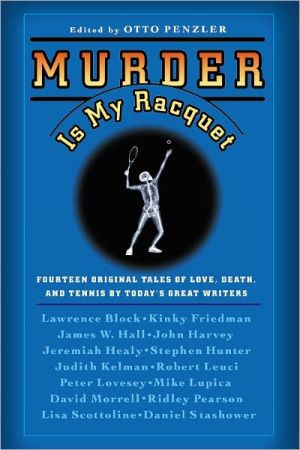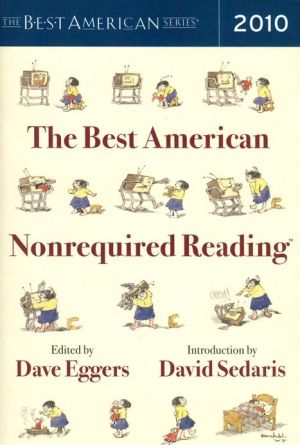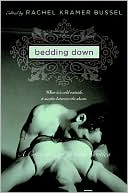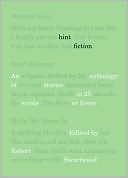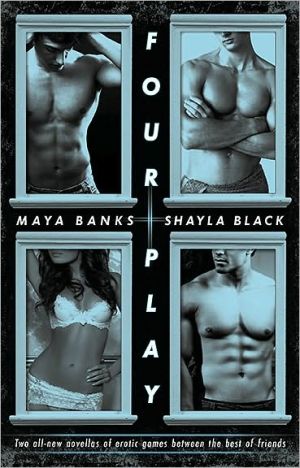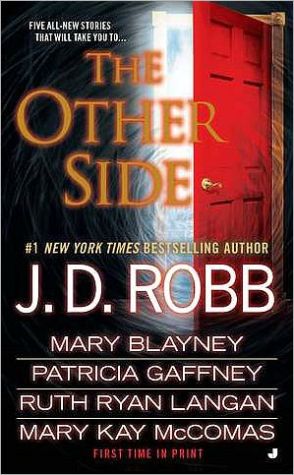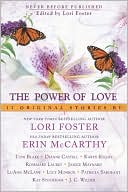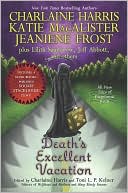Murder Is My Racquet
Murder is My Racquet is the most thrilling way to read about tennis, murder and intrigue. This collection of stories by famous mystery writers, including Ridley Pearson and Lawrence Block, deal with the prestige of the high-stakes race to become one of the few international tennis stars, the promotional opportunities involved, the elimination of tournament competition, and the strategy of tennis in general. Viewed as an elite game since its beginnings, tennis is the perfect sport for...
Search in google:
Tennis is a sport for champions. Years of practice, the right attire, the best racquet, shoes, and coach make for the best players. And, the best players make all the money and get all the promotional contracts and sponsorships. Only a few are good enough, and in these stories, it's a fight to the finish. Authors like Ridley Pearson and Lawrence Block bring you murder on and off the court. With stakes so high, the sport is on. Otto Penzler is the dean of mysteries, owning the Mysterious Bookshop in Manhattan, one of the world's largest mystery specialty stores. He published the Armchair Detective, the Edgar-winning mystery journal devoted to the study of mystery and suspense fiction for over 17 years. He is the editor of New Millennium's other highly acclaimed sports anthology titles Murderers' Row (baseball mysteries) and Murder on the Ropes (boxing mysteries).Publishers WeeklyMystery maven Penzler's latest all-original sports anthology offers 14 mostly high-quality tales of the underside of lawn tennis, the traditional game of sometimes not so gentle men (and women). There's something to suit every taste, from the short and light (Daniel Stashower's "A Peach of a Shot" and Kinky Friedman's "Tennis, Anyone?") to grittier psychological stories (John Harvey's "Promise" and Robert Leuci's "A Killer Overhead"). In Lisa Scottoline's amusing "Love Match," the tennis-playing protagonist is just plain lucky to be in the right place at the right time. Set in the South in 1948, Stephen Hunter's gripping "Stephen Longacre's Greatest Match" provides a lesson in race relations when a young white man, a ne'er-do-well from a wealthy family, tries to redeem himself by taking on a poor black man as his doubles partner. Notable chiefly for its closing pun is David Morrell's "Continental Grip," about the baffling murder of a Sante Fe, N.Mex., tennis pro. Other top-rank contributors include Lawrence Block, James W. Hall, Peter Lovesey and Judith Kelman. This tome is the perfect companion to have in the bag for those rain delays at Wimbledon. Agent, Nat Sobel. (June 2) Copyright 2005 Reed Business Information.
Murder Is My Racquet\ \ By Otto Penzler \ Mysterious Press\ Copyright © 2005 Otto Penzler\ All right reserved. \ ISBN: 0-892-96015-9 \ \ \ Chapter One\ Terrible Tommy Terhune\ Lawrence Block\ As every high school chemistry student knows," wrote sportswriter Garland Hewes, "the initials TNT stand for tri-nitro-toluene, and the compound so designated is an explosive one indeed. And, as every tennis fan is by now aware, the same initials stand as well for Thomas Norton Terhune, supremely gifted, immensely personable, and, as he showed us once again yesterday on the clay courts of Roland Garros, an unstable and violently explosive mixture if ever there was one, and a grave danger to himself and others."\ The incident to which the venerable Hewes referred was one of many in Tommy Terhune's career in world-class tennis. In the French Open's early rounds, he dazzled players and spectators alike with the brilliance of his play. His serve was powerful and on-target, but it was his inspired all-around play that lifted him above the competition. He was quick as a cat, covering the whole court, making impossible returns look easy. His drop shots dropped, his lobs landed just out of his opponent's reach but just inside the white line.\ But when the ball was out, or, more to the point, when the umpire declared it to be out, Tommy exploded.\ In his quarterfinal match at Roland Garros, a shot of Terhune's, just eluding the outstretched racquet of his Montenegrin opponent, landed just inside the baseline.\ The umpire called it out.\ As the television replay would demonstrate, time and time again, the call was an error on the official's part. The ball did in fact land inside the line, by two or three inches. Thus Tommy Terhune was correct in believing that the point should be his, and he was understandably dismayed at the call.\ His behavior was less understandable. He froze at the call, his racquet at shoulder height, his mouth open. While the crowd watched in anticipatory silence, he approached the umpire's raised platform. "Are you out of your mind?" he shouted. "Are you blind as a bat? What the hell is the matter with you, you pop-eyed frog?"\ The umpire's response was inaudible, but was evidently uttered in support of his decision. Tommy paced to and fro at the foot of the platform, ranting, raving, and drawing whistles of disapproval from the fans. Then, after a tense moment, he returned to the baseline and prepared to serve.\ Two games later in the same set, he let a desperate return of his opponent's drop. It was long, landing a full six inches beyond the white line. The umpire declared it in, and Tommy went berserk. He screamed, he shouted, he commented critically on the umpire's lineage and sexual predilections, and he underscored his remarks by gripping his racquet in both hands, then swinging it like an axe as if to chop down the wooden platform, perhaps as a first step to chopping down the official himself. He managed to land three ringing blows, the third of which shattered his graphite racquet, before another official stepped in to declare the match a forfeit, while security personnel took the American in hand and led him off the court.\ The French had never seen the like and, characteristically, their reaction combined distaste for Terhune's lack of savoir-faire with grudging respect for his spirit. Phrases like enfant terrible and monstre sacre turned up in their press coverage. Elsewhere in the world, fans and journalists said essentially the same thing. Terrible Tommy Terhune, the tennis world's most gifted and most temperamentally challenged player, had proven to be his own worst enemy, and had succeeded in ousting himself from a tournament he'd been favored to win. He had done it again.\ * * *\ The racquet Tommy shattered at the French Open was not the first one to go to pieces in his hands. His racquets had the life expectancy of a rock star's guitar, and he consequently had learned to travel with not one but two spares. Even so, he'd been forced to withdraw from one tournament in the semifinal round, when, after a second double fault, he held his racquet high overhead, then brought it down full-force upon the hardened playing surface. He had already sacrificed his other two racquets in earlier rounds, one destroyed in similar fashion to protest an official's decision, the other snapped over his knee in fury at himself for a missed opportunity at the net. He was now out of racquets, and unable to continue. His double fault had cost him a point; his ungovernable rage had cost him the tournament.\ Such episodes notwithstanding, Tommy won his share of tournaments. He did not always blow up, and not every episode led to disqualification. In England, one confrontation with an official provoked a clamor in the press that he be refused future entry, not merely to Wimbledon, but to the entire United Kingdom; in response, Tommy somehow held himself in check long enough to breeze through the semifinals, and, in the final round, treated the fans to an exhibition of play unlike anything they'd seen before.\ Playing against Roger MacReady, the rangy Australian who was the crowd's clear favorite, Tommy played Centre Court at Wimbledon as Joe DiMaggio had once played center field at Yankee Stadium. He anticipated every move MacReady made, moving in response not at the impact of ball and racquet but somehow before it, as if he knew where MacReady was going to send the ball before the Australian knew it himself. He won the first two sets, lost the third in a tiebreaker, and soared to an easy victory in the fourth set, winning 6-1, and winning over the crowd in the process. By the time his last impossible backhand return had landed where MacReady couldn't get to it, the English fans were on their feet cheering for him.\ A month later, the laurels of Wimbledon still figuratively draped around his shoulders, Terrible Tommy Terhune diagnosed an official as suffering severely from myopia, astigmatism, and tunnel vision, and recommended an unorthodox course of ophthalmological treatment consisting of the performance of two sexual acts, one incestuous, the other physically impossible. He then threw his racquet on the ground, stepped on its face, and pulled up on its handle until the thing snapped. He picked up the two pieces, sailed them into the crowd, and stalked off the court.\ * * *\ Morley Safer leaned forward. "If you were watching a tennis match," he began, "and saw someone behave as you yourself have so often behaved-"\ "I'd be disgusted," Tommy told him. "I get sick to my stomach when I see myself on videotape. I can't watch. I have to turn off the set. Or leave the room."\ "Or pick up a racquet and smash the set?"\ Tommy laughed along with the TV newsman, then assured him that his displays of temper were confined to the tennis court. "That's the only place they happen," he said. "As to why they happen, well, I know what provokes them. I get mad at myself when I play poorly, of course, and that's led me to smash a racquet now and then. It's stupid and self-destructive, sure, but it's nothing compared to what happens when an official makes a bad call. That drives me out of my mind."\ "And out of control?"\ "I'm afraid so."\ "And yet there are skeptics who think you're crazy like a fox," Safer said. "Look at the publicity you get. After all, you're the subject of this 60 Minutes profile, not Vasco Barxi, not Roger MacReady. All over the world, people know your name."\ "They know me as a maniac who can't control himself. That's not how I want to be known."\ "And there are others who say you gain by intimidating officials," Safer went on. "You get them so they're afraid to call a close point against you."\ "They seem to be dealing with their fears," Tommy said. "And wouldn't that be brilliant strategy on my part? Get tossed out of a Grand Slam tournament in order to unnerve an official?"\ "So it's not calculated? In fact it's not something subject to your control?"\ "Of course not."\ "Well, what are you going to do about it? Are you getting help?"\ "I'm working on it," he said grimly. "It's not that easy."\ * * *\ "It's rage," he told Diane Sawyer. "I don't know where it comes from. I know what triggers it, but that's not necessarily the same thing."\ "A bad call."\ "That's right."\ "Or a good call," Sawyer said, "that you think is a bad call."\ Tommy shook his head ruefully. "It's embarrassing enough to explode when the guy gets it wrong," he said. "The incident I think you're referring to, where the replay clearly showed he'd made the right call, well, I felt more ashamed of myself than ever. But even when I'm clearly right and the official's clearly wrong, there's no excuse for my behavior."\ "You realize that."\ "Of course I do. I may be crazy, but I'm not stupid."\ "And if you are crazy, it's temporary insanity. As I think our viewers can see, you're perfectly sane when you don't have a tennis racquet in your hand."\ "Well, they haven't asked me to pose for any Mental Health posters," he said with a grin. "But it's true I don't have to struggle to keep a lid on it. That only happens when I'm playing tennis."\ "The court's where the struggle takes place."\ "Yes."\ "And when you honestly think a call has gone against you, that it's a bad call ..."\ "Sometimes I can keep myself in check. But other times I just lose it. I go into a zone and, well, everybody knows what happens then."\ "And there's nothing you can do about it."\ "Not really."\ "You've had professional help?"\ "I've tried a few things," he said. "Different kinds of therapy to help me develop more insight into myself. I think it's been useful, I think I know myself a little better than I used to, but when some clown says one of my shots was out when I just plain know it was in-"\ "You're helpless."\ "Utterly," he said. "Everything goes out the window, all the insight, all the coping techniques. The only thing that's left is the rage."\ * * *\ "You have a life most women would envy," Barbara Walters told Jennifer Terhune. "You're young, you're beautiful, you've had success as a model and as an actress. And you're the wife of an enormously talented and successful athlete."\ "I've been very fortunate."\ "What's it like being married to a man like Tommy Terhune?"\ "It's wonderful."\ "The clothes, the travel, the VIP treatment ..."\ "That's all nice," Jennifer acknowledged, "but it's, like, the least of it. Just being with Tommy, sharing his life, that's what's truly wonderful."\ "You love your husband."\ "Of course I do."\ "But I'm sure there are women in my audience," Walters said, "who wonder if you might not be the least bit afraid of your husband."\ "Afraid of Tommy?"\ Walters raised her eyebrows. "Mr. TNT? Terrible Tommy Terhune?"\ "Oh, that."\ "'Oh, that.' You're married to a man with the most famously explosive temper in the world. Don't tell me you're never afraid that something you might do or say will set him off."\ "Not really."\ "What makes you so confident, Jennifer?"\ "Tommy has a problem with rage," Jennifer said, "and I recognize it, and he recognizes it. He's been working on it, trying a lot of different things, like, to help him cope with it. I just know he'll be able to get a handle on it."\ "And I'm sure our hopes are with him," Walters said, "but that doesn't address the question, does it? What about you, Jennifer? How do you know that terrible temper, that legendary rage, won't one day be aimed at you?"\ "I'm not an umpire."\ "In other words ..."\ "In other words, the only time Tommy loses it, the only time his temper is the least bit of a problem, is when an official makes a bad call against him on the tennis court. He never gets mad at an opponent. He doesn't go into the stands after fans who make insulting remarks, and I've heard some of them say some pretty outrageous things. But he takes that sort of thing in stride. It's only bad calls that set him off."\ "And after an explosion?"\ "He's contrite. And ashamed of himself."\ "And angry?"\ "Only during a match. Not afterward."\ "So it's never directed at you?"\ "Never."\ "He's a perfect gentleman?"\ "He's thoughtful and gentle and funny and smart," Jennifer said, "in addition to being the best tennis player in the world. I'm a lucky girl."\ Later, watching herself on television, Jennifer thought the interview had gone rather well. She sounded a little ditsy, saying like often enough to sound like a Valley Girl, but outside of that she'd done fine. Her hair, which had caused her some concern, wound up looking great on camera, and the dress she'd worn had proved a good choice.\ And her comments seemed okay, too. The likes notwithstanding, she came across not as an airhead but as a concerned and supportive life partner and helpmate. And, she told herself, that was fair enough. Everything she'd said had been the truth.\ Though not, she had to admit, the whole truth. Because how could she have sat there and told Barbara Walters that Tommy's temper was one of the things that had attracted her to him in the first place? All of that intensity, when he served and volleyed and made impossible shots look easy, well, it was exciting enough. But all of that passion, when he roared and ranted and just plain lost it, was even more exciting. It stirred her up, it got her juices flowing. It made her, well, hot-and how could she say all that to Barbara Walters?\ In fact, when you came right down to it, she was a little disappointed that Tommy never lost it except on the tennis court. It was a pity, in a way, that he never brought that famous temper home with him, that he never lost it in the bedroom.\ Sometimes-and she would never admit this to anyone, on or off camera-sometimes she tried to provoke him. Sometimes she tried to make him mad. Even if he were to get physical, even if he were to slap her around a little, well, maybe it was kinky of her, but she thought she might like that.\ But it was hopeless. On the court, with a racquet in his hand and an official to argue with, he was Mr. TNT, the notorious Terrible Tommy Terhune. At home, even in the bedchamber, he was what she'd said he was, the perfect gentleman.\ Darn it ...\ * * *\ "So we begin to make progress," the psychoanalyst said. "The need to win your father's approval. The approval sometimes granted, other times withheld, for reasons having nothing to do with your own behavior."\ "It wasn't fair," Tommy said.\ "And that is what so infuriates you about a bad call on the tennis court, is it not so? The unfairness of it all. You have done everything you were supposed to do, everything within your power, and still the approval of the man in authority is denied to you. Instead he sits high above you, remote and unreachable, and punishes you."\ "That's exactly what happens."\ "And it is unfair."\ Continues... \ \ \ \ Excerpted from Murder Is My Racquet by Otto Penzler Copyright © 2005 by Otto Penzler . Excerpted by permission.\ All rights reserved. No part of this excerpt may be reproduced or reprinted without permission in writing from the publisher.\ Excerpts are provided by Dial-A-Book Inc. solely for the personal use of visitors to this web site. \ \
Terrible Tommy Terhune1Tennis, anyone?24Six love31Promise52A debt to the devil72Stephen Longacre's greatest match104No strings132A killer overhead162Needle match183The rematch203Continental grip230Close shave242Love match289A peach of a shot308
\ From Barnes & NobleThe Barnes & Noble Review\ Although editor Otto Penzler states in the introduction to Murder Is My Racquet that the term "tennis" conjures up images of fresh white clothes, elite country clubs, and well-mannered applause, his newest anthology of tennis-related mysteries is anything but genteel. \ Featured within are 14 never-before-published stories by some of the genre's biggest names, including Lawrence Block, Lisa Scottoline, Kinky Friedman, David Morrell, and Ridley Pearson. The world's most talented -- and temperamentally challenged -- tennis player is the focus of Block's "Terrible Tommy Terhune." Mr. TNT, as he has been tagged by the media, is a loose cannon on the court. Cussing out officials, breaking racquets, and getting ejected from matches has led Tommy to try different therapies for his uncontrollable temper tantrums. When all other treatments fail, Tommy secretly travels to West Africa and participates in a voodoo ceremony -- with unforeseen results. "Needle Match" by Peter Lovesey is a mystery about a Wimbledon ball boy who, in 1981 when John McEnroe defeated Bjorn Borg in a legendary battle, witnessed an unlikely -- and unsolved -- murder right on the courts. Daniel Stashower's "A Peach of a Shot" explores relationships, doubles tennis, and those once-in-a-lifetime overhead smashes that your spouse will never forget…\ The strength of this uniquely themed anthology, aside from the impressive all-star list of contributors, is its sheer diversity; no two stories are even remotely similar. Featuring a range of fascinating characters, from Mafia hit men to conniving proctologists to homicidal parents of promising young athletes, this collection of tennis-inspired whodunits is, simply put, superb. Paul Goat Allen\ \ \ \ \ \ Publishers WeeklyMystery maven Penzler's latest all-original sports anthology offers 14 mostly high-quality tales of the underside of lawn tennis, the traditional game of sometimes not so gentle men (and women). There's something to suit every taste, from the short and light (Daniel Stashower's "A Peach of a Shot" and Kinky Friedman's "Tennis, Anyone?") to grittier psychological stories (John Harvey's "Promise" and Robert Leuci's "A Killer Overhead"). In Lisa Scottoline's amusing "Love Match," the tennis-playing protagonist is just plain lucky to be in the right place at the right time. Set in the South in 1948, Stephen Hunter's gripping "Stephen Longacre's Greatest Match" provides a lesson in race relations when a young white man, a ne'er-do-well from a wealthy family, tries to redeem himself by taking on a poor black man as his doubles partner. Notable chiefly for its closing pun is David Morrell's "Continental Grip," about the baffling murder of a Sante Fe, N.Mex., tennis pro. Other top-rank contributors include Lawrence Block, James W. Hall, Peter Lovesey and Judith Kelman. This tome is the perfect companion to have in the bag for those rain delays at Wimbledon. Agent, Nat Sobel. (June 2) Copyright 2005 Reed Business Information.\ \ \ Fourteen original tales of "love, death, and tennis" from Lawrence Block, Kinky Friedman, John Harvey, and more! Copyright 2005 Reed Business Information.\ \ \ \ \ Fourteen new tennis-themed short stories by good authors writing their worst. The only players who show a modicum of style and originality are ex-cop Robert Leuci, whose "A Killer Overhead" sets a hit man loose on an abusive spouse and then on the displeased tennis dad who gets more than he bargained for, and Jeremiah Healy, whose "A Debt to the Devil" takes a p.i. to a tennis community to solve a wrongly labeled felony-murder. More predictably, and flatly, umpires take revenge on an aging tennis brat (Mike Lupica), a McEnroe clone shows his temper off-court (Lawrence Block), voodoo decimates the school tennis team (Judith Kelman), the country club set is set back by an inner-city kid (Stephen Hunter), the ballboys compete (Peter Lovesey), a duffer takes a swing (David Morrell), the mob and the FBI surround the court (Ridley Pearson), the D.A. gets a tennis lesson (Lisa Scottoline), a phenom gets whacked (James W. Hall), a couple serves badly (Daniel Stashower) and a baby disrupts play (John Harvey). Kinky Friedman barely acknowledges the anthology's theme in "Tennis, Anyone?" but by this time readers will have had their fill of smashes, lobs, lines calls and the drama of watching grass grow at Wimbledon. Editor Penzler must have thought tennis mysteries would be as profitable as anthologies headlining cats or Christmas, but the only way this works is as a soporific.\ \
